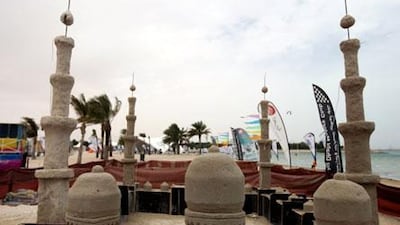In a land dominated by dunes, sand sculpting can become a serious business. Just ask Fouad Yousef and Mohammed Ragaey. Others might be content to fashion a rudimentary sandcastle on the beachfront at Mirfa, in Abu Dhabi's western region, but this pair from Madinat Zayed have taken on the challenge of creating a mammoth scale model of the Sheikh Zayed Mosque.
Their construction includes four soaring minarets, like the original, complete with lights and tiny speakers. And their budget has already far exceeded the prize money on offer for first place in the sand sculpting category of the Al Gharbia Watersports Festival at Mirfa. Obsession? No, they say, their beach sculptures are about a combination of pride and meeting a challenge. "Before, we were doing this on the beach for fun," Ragaey said.
"Anywhere we'd go, we'd do this. We'd make a dolphin or a shark or a crocodile. We'd also make animals like lions and tigers." That hobby took on a more structured form when the first Al Gharbia Watersports Festival was held last year and included a sand sculpture category. Yousef, 35, a supervisor, and Ragaey, 25, an accountant, teamed up for the competition. "We did a big dragon - maybe 10 metres - and a crocodile, a camel and a castle," Yousef said.
Ragaey: "Someone else made a big turtle. Someone made the Emirates map. "Last year we came first." Flush with their victory, they immediately began plotting how to defend their title at this year's watersports festival. "Last year we were already planning to build the Sheikh Zayed Mosque this year," Ragaey said. "It's something from this country." A month ago they began assembling the materials for the mosque, including formwork - a cradle created from marine plywood that will be filled with sand - and mesh-covered welded metal towers that would form the basis of the four minarets.
They recruited six workers to help them, and the team gathered on the beach at Mirfa several days before the start of the 10-day watersports festival to start work. First they had to transport the sand from the intertidal zone and transport it to the bay they've been allocated by the festival organisers. Before they could even start work, the sand had to be shoveled through a metal screen. "We filter the sand because there's gravel and shells," Ragaey said.
The wooden formworks that will form the outline of the main sections of the mosque were then screwed together, forming a rectangular structure, tiered to waist height where the main prayer hall is located, with a large central courtyard. Then the hard work began. "Artini mai (give me water)," Yousef asks of a worker with a hose as another shovels filtered beach sand into place inside the formwork.
The water will consolidate the sand and they then walk up and down to stomp it down further so that it will be strong enough to retain its shape when the formwork is removed. It's hard work and the sea breeze is not enough to obviate the heat of the physical labour. "We come here at 10 in the morning," Ragaey says, "and we're here until 12 or 1 in the night." Yousef says his back hurts but he uses a piece of scrap plywood to level the sand at the height of the top of the formwork. "Tomorrow we'll remove the wood and we start on the sand, making doors and making windows," he says. "Everybody is tired from the work now."
That was on the opening day of the festival last weekend. As others competed in kitesurfing and dhow and kayak races, or wandered through the souq selling traditional and modern goods, Yousef and Ragaey and their team formed the central domes of the main prayer hall and then filled the mesh of the towers to create the minarets. "It will take four days to complete, insh'allah," Yousef adds. But a strong wind that was good for kitesurfing was bad for building a mosque made of sand, and instead of removing the formwork and using plywood templates to start carving the collonades, they had to put the project on hold until the weather improved.
Their Dh8,000 budget, including all the materials and the labourers they had recruited, was already more than the Dh5,000 prize money on offer for first place but they are sponsored by Al Dhafra Co-operative Society. "If we win this time, ask me what we'll do next year," Yousef says. "What will you do next year?" I ask. "I don't know," he says and bursts into laughter.

